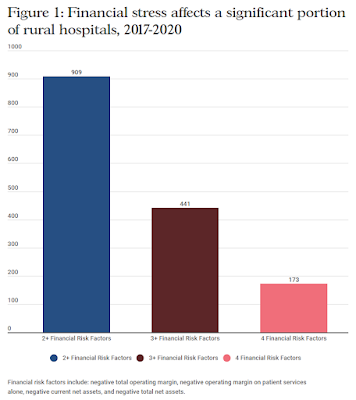 |
| Amy Duncan and Mark Davitt |
Add Indianola, Iowa, to the list of places where
Gannett Co. is selling a newspaper. Two former executives of The Indianola Record-Herald and the Indianola Tribune
are buying the operation and plan to publish a weekly print edition along with the
Independent Advocate, a website they started in January 2019. (
Here's Gannett's story on it.)
Paxton Media Group, one of the few chains buying newspapers, has purchased The Corydon Democrat and the Clarion News from the O'Bannon family, which had owned the Democrat since 1907 and included the late Frank O'Bannon, Indiana governor in 1997-2003. Paxton, based in Paducah, Ky., owns several other papers in southern Indiana and about half of those in western Kentucky (and about a third of those in the state as a whole).
Last week's State of Local News 2022 report from Northwestern University showed that Texas has lost more newspaper journalists, relative to population, than any state except two that are more urbanized, reports Sewell Chan, editor of The Texas Tribune: "Over the past 17 years, the Lone Star State lost about eight newspaper journalists per 10,000 residents, while California and New Jersey each lost around 10 at that same rate. . . . Over that period, Texas lost about one-third of its newspapers — 211 closed, leaving 423. . . More than one-tenth of Texas counties — 27 of 254 — no longer have a local newspaper, daily or weekly."
One more may be soon be added to that list. Chan reports that O.D. and Carolyn W. Anderson published the last edition of the Rocksprings Record and Texas Mohair Weekly June 30 and are still looking for a buyer. “My husband and I are 78 and 84, we have some health issues,” Carolyn Anderson told Chan last week. “We have two daughters, but they have their very separate lives. . . . We have a little bit of interest, but not enough right now.” Edwards County, in southwest Texas, has 2,000 people.
Here's a report from Gateway Journalism Review on the Western Iowa Journalism Foundation, which "works to target specific counties in Western Iowa to help raise money for publications to fund projects – both big and small." Its part-time executive director, Becky Vonnahme, told Olivia Cohen, “In rural areas especially, our mission right now is that you just need to have a valid news source; so many parts of the country in rural areas have lost their newspaper and we really feel, at the foundation that it is leading to the misinformation and the disinformation, peoples reliance on social media … because there isn’t a valid news source.”
 |
| Emily Weaver |
Emily Weaver had to close the weekly
Mount Olive Tribune, but "Losing this one has encouraged me to work even harder to propel
The Daily Record forward in Dunn,"
she tells a former North Carolina colleague. "I have new goals and plans to reach them." In a farewell note, she told readers, "Every community needs that check and balance, that watchdog who tells people when their taxes are going up and when their hard-earned tax dollars are misspent. They need someone to let them know what happened next door when all of the police cars were there or where to find that special bargain or how to contact their legislator who represents them. Newspapers and media outlets do that every day. And they provide it all in one forum. People might learn snippets of what's going on around them on social media, but random posters, who hide behind screen names and avatars, aren't fact-checking the way a journalist is required to do. If you don't know the source, how can you trust it?" The Tribune's closure prompted one of its former reporters, Jacqueline Hough of the
Herald-Advocate in Bennettsville, S.C., to write
an editorial about the importance of community newspapers; it included separate references that may have been related: "In the last eight months, I have done more as a news editor/reporter than in my 21 years in journalism. . . . the Herald-Advocate was purchased by
Champion Media on Sept. 30, 2021."
When newspapers fold, polarization rises, CNET reports; here's what you can do about it.

















